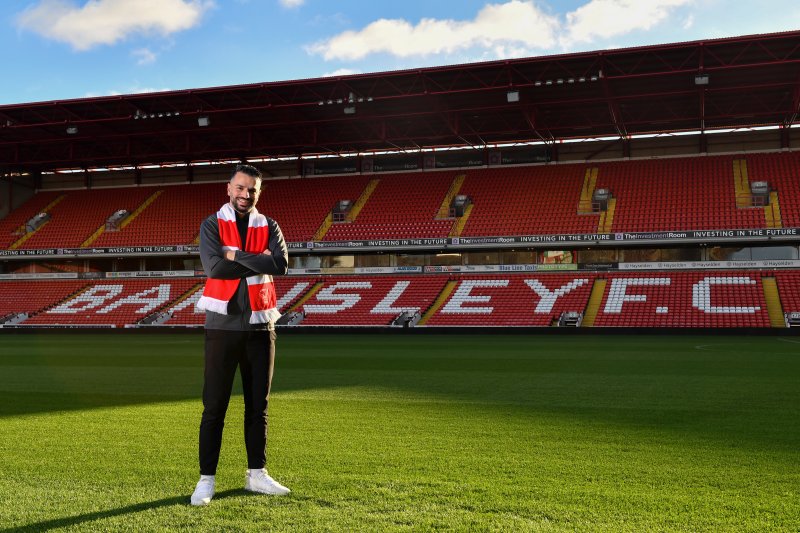BARNSLEY’S tumultuous weekend began with relegation on Friday evening and ended with the Sunday announcement that Poya Asbaghi had left the club by mutual consent after a disappointing 155-day spell.
The Swedish coach is not the main culprit for the drop to League One. More responsible are co-owner Paul Conway – who oversaw a terrible last summer off the pitch from which the Reds could never recover – predecessor Markus Schopp, the only Barnsley boss with a lower win percentage than Poya’s 16, and many of the players who have regressed badly after last season's fifth-placed finish.
But Asbaghi was not the right man for a Championship relegation fight, will not be remembered fondly by many supporters and has inked his name near the bottom of the stats list of the club’s bosses.
The 36-year-old was, the Chronicle understands, extremely close to being sacked early in the year as he broke an unwanted club record for 11 league games without a first victory. But he managed to save himself with a cluster of wins in late February and early March, before a terrible April saw them relegated with three games to spare.
The Reds were not expecting to part company with Asbaghi after Friday’s relegation, instead waiting until the end of the season when there was a break clause in his contract, but plans changed at some point on Saturday evening or Sunday morning.
Asbaghi has told Swedish news outlet Expressen that he told the club in March that he would leave regardless of what league they would be in. He added: “Now that the season is basically over, it is better to hand over to those who can take this further.”
It is another messy incident to add to the long list for Barnsley’s chief executive and board to assess and learn from after this humiliating season.
Whoever made the decision, it makes sense from Barnsley’s perspective. It may help to avoid the atmosphere in the final three games – especially the home matches this week – being completely funereal and potentially turning toxic.
Although relegation will always cast a dark cloud, Asbaghi’s replacement by a popular former player in Martin Devaney may slightly lift the mood in the stands while a change often freshens up a dressing room. With the deadline for early bird season tickets approaching, this news may have encouraged some to renew.
Here are some of the key factors in Poya’s ill-fated reign:
A TOUGH TASK TO BEGIN WITH
Asbaghi inherited a very difficult situation, with a squad that was extremely weak in several key areas and who had won two of 19 matches with most of the confidence from last season’s play-off campaign being drained out of them.
The gap to safety doubled from four points to eight in his first week in the role then, although he reduced it at times, he never looked like fully bridging it.
A month into his tenure, he was training with as few as nine first teamers due to Covid-19 cases and injuries and, although the loan January signings of Amine Bassi and Domingos Quina gave him an attacking threat Schopp never had, the club still failed to sign the experience midfielder desperately needed. The loss of captain Cauley Woodrow for four months was a huge blow, as were the season-ending injuries to Jordan Williams, Michal Helik and Brad Collins.
A PROJECT MANAGER NOT A FIREFIGHTER
Poya came across as a good person, who was popular at Oakwell and respected for his coaching abilities. The players enjoyed working with him far more than his predecessor, with his work ethic and meticulous preparation impressing.
But he was not the fire-fighting, inspirational figure the Reds needed in a relegation battle. He has also admitted he did not know much about the players and league when he arrived, which held him back at first.
This squad needed someone with more of a fear factor, to instil discipline and set higher standards – which both Valerien Ismael and Gerhard Struber managed to do with their authoritarian no-nonsense approach. Poya was unable to do that.
SUBSTITUTIONS
Asbaghi tried to work out which players were regularly costing points and holding the side back. He reduced gametime of the likes of Devante Cole, Josh Benson, Aaron Leya Iseka, Jasper Moon and, until recent weeks, Romal Palmer, then found a consistent 11 which won three out of four.
But they could not continue that good form with a series of games when they conceded an equaliser in the final ten minutes – often because of an error by a substitute Asbaghi brought on.
It would be harsh to blame him for some of the inexplicable errors such as Cole’s against Stoke or Benson and Palmer’s mix-up against Fulham, but introducing Moon at Coventry where the defender gifted his hometown club an injury-time winner was baffling.
Asbaghi had a very thin squad in terms of quality and quantity, but used it badly at times.
TOO DEFENSIVE
Poya was extremely defensive in his first games at home to Swansea then away at Peterborough – a big chance to beat a fellow struggler – with the Reds barely venturing forward.
That was a part of a policy to sort out a leaky defence at first but the planned evolution into a better attacking team never came, certainly not consistently.
Considering the ability of the likes of Bassi, Quina, Callum Styles and Carlton Morris, his team produced many spells when they looked totally sterile and clueless in attack.
They would regularly take the lead then sit deeper and deeper until they conceded, with Poya then saying post-match that that was not the problem.
The worst example was in the crucial match with fellow relegation strugglers Reading on April 2.
The Reds scored in the fifth minute but did not have another shot on target, with Callum Brittain admitting ‘we didn’t know what to do after we took the lead.’
The Royals dominated and eventually levelled, denying their hosts the chance to cut the gap to two points so it stayed at five then got bigger and bigger until the Reds were down.
Asbaghi admitted Barnsley could never ‘mentally recover’ from the Reading draw.
He only collected a point from three games against the other sides in the bottom four, losing meekly to Derby and Peterborough.


























